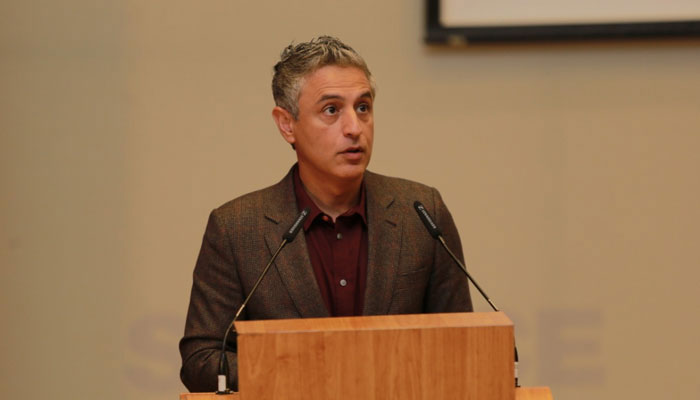An enlightening lecture on why humans believe
The auditorium of the Habib University was on Thursday the venue of an analytical lecture by Iranian-American scholar Dr Reza Aslan under the title, “Why do we believe?”
He discussed as to why religion was such a fundamental aspect of human beings. Covering a wide range of areas, Dr Aslan said that as long as people continue to ponder as to why we are there and the purpose of our existence, the power of spirituality and belief would continue to play an important role in the course of human events.
“In this day when religiously motivated violence and extremism and upheavals trouble so many parts of the world, it is essential to realise that at the heart of all religions is the message of humanity and compassion towards fellow humans,” he said.
Speaking at the micro level, he said that faith was something that was embedded in the brain. Religion, he said, was the language we used to express faith. “Throughout history, we have striven to give God a name and attribute all noble human values to Him,” he said.
He quoted Abu Hanifa’s statement that “God resembles no known thing and no known thing resembles God”. “God is a faith which Islam stipulates,” he said. “We have to look at things divine as part of the human experience.”
Many, Dr Aslan said, felt that religions helped humans explain phenomena that were otherwise inexplicable. Others, he said, believed that religions helped humans cope with sorrow, adversity and fear of the unknown.
However, he took care to tell the audience that he did not disbelieve in the non-material or the spiritual world and said that such mysteries would unravel themselves as time went by and new vistas in human knowledge opened.
“The God I believe in is a God who doesn’t share my prejudices and my weak points. He is essentially not human,” Aslan said. Religion and belief, he said, was a neurological phenomenon, electro-chemical actions in the brain.
“I believe we have been created in the image of God as regards his actions. We have to redefine what collective identity means.” The main lecture was followed by a conversation between Aslan and Dr Christopher Taylor, vice-president of Habib University.
He reiterated that he himself believed in God but that his beliefs were somewhat unconventional. He took care to state that one could not just discount the possibility of God’s existence. Dr Aslan, it may be noted, is currently at the University of Santa Clara, Riverside, California, USA, and is the head of the department of comparative religions at the university.
He is the author of many international bestsellers, some of which are, “No god but God”, “The origins of evolution”, “The future of Islam”, and “The life and times of Jesus of Nazareth”.
-
 Why Prince William Releases Statement On Epstein Scandal Amid Most 'challenging' Diplomatic Trip?
Why Prince William Releases Statement On Epstein Scandal Amid Most 'challenging' Diplomatic Trip? -
 Historic Mental Health Facility Closes Its Doors
Historic Mental Health Facility Closes Its Doors -
 Top 5 Easy Hair Fall Remedies For The Winter
Top 5 Easy Hair Fall Remedies For The Winter -
 Japan Elections: Stock Surges Record High As PM Sanae Takaichi Secures Historic Victory
Japan Elections: Stock Surges Record High As PM Sanae Takaichi Secures Historic Victory -
 Prince William, Kate Middleton Finally Address Epstein Scandal For First Time: 'Deeply Concerned'
Prince William, Kate Middleton Finally Address Epstein Scandal For First Time: 'Deeply Concerned' -
 Kim Kardashian Promised THIS To Lewis Hamilton At The 2026 Super Bowl?
Kim Kardashian Promised THIS To Lewis Hamilton At The 2026 Super Bowl? -
 Andrew Mountbatten-Windsor Throws King Charles A Diplomatic Crisis
Andrew Mountbatten-Windsor Throws King Charles A Diplomatic Crisis -
 Barack Obama Hails Seahawks Super Bowl Win, Calls Defense ‘special’
Barack Obama Hails Seahawks Super Bowl Win, Calls Defense ‘special’ -
 Pregnant Women With Depression Likely To Have Kids With Autism
Pregnant Women With Depression Likely To Have Kids With Autism -
 $44B Sent By Mistake: South Korea Demands Tougher Crypto Regulations
$44B Sent By Mistake: South Korea Demands Tougher Crypto Regulations -
 Lady Gaga Makes Surprising Cameo During Bad Bunny's Super Bowl Performance
Lady Gaga Makes Surprising Cameo During Bad Bunny's Super Bowl Performance -
 Paul Brothers Clash Over Bad Bunny's Super Bowl Performance
Paul Brothers Clash Over Bad Bunny's Super Bowl Performance -
 South Korea: Two Killed As Military Helicopter Crashes During Training
South Korea: Two Killed As Military Helicopter Crashes During Training -
 Elon Musk Unveils SpaceX’s Moon-first Strategy With ‘self Growing Lunar City’
Elon Musk Unveils SpaceX’s Moon-first Strategy With ‘self Growing Lunar City’ -
 Donald Trump Slams Bad Bunny's Super Bowl Performance: 'Absolutely Terrible'
Donald Trump Slams Bad Bunny's Super Bowl Performance: 'Absolutely Terrible' -
 Jake Paul Criticizes Bad Bunny's Super Bowl LX Halftime Show: 'Fake American'
Jake Paul Criticizes Bad Bunny's Super Bowl LX Halftime Show: 'Fake American'




